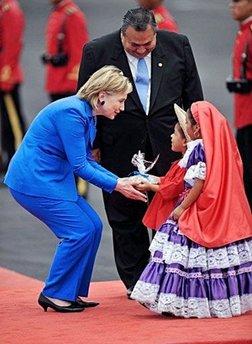Cuba's readmission is expected to dominate the agenda of the ministerial conference of the 34-nation Organization of American States (OAS) from Monday to Wednesday.
The Caribbean island nation was expelled from the group in 1962. Its members now have mixed views on Havana's return, and the current OAS meeting in Honduras industrial city San Pedro Sula might see heated debate over the matter.
The U.S. Secretary of State Hillary Clinton said two weeks ago that her country would not support Cuba to rejoin the OAS unless it carried out political reforms.
 |
|
US Secretary of State Hillary Clinton (L) receives a gift from Salvadorean children in traditional dress upon her arrival at El Salvador International Airport in Comalapa, some 45 kilometers south of San Salvador. Clinton began a visit to Central America Sunday, amid new US steps toward ties with Cuba that Washington hopes will slow a sudden regional push to end Havana's isolation. [Yuri Cortez/AFP] |
Cuba's return to the OAS depends on the fact that it is willing to accept democracy, she said.
Meanwhile, Nicaragua proposes bringing Cuba back immediately and unconditionally, saying that the 1962 expulsion was an "error and an act of injustice."
Venezuela and Bolivia, who are politically close to Cuba, also voiced supports for Cuba's return.
The OAS member nations are expected to vote on Cuba's readmission on Tuesday, and if 23 of the 34 members cast the "yes" vote, the island country would be allowed to join the century-old group again.
However, the nation at the center of the spat has repeatedly said that it had no desire to rejoin the OAS, which, as former Cuban leader Fidel Castro said last month, "has not done a single service to our people."
Cuba was shut out of the OAS in 1962 during the Cold War when the United States imposed pressure on the organization in an attempt to overthrow the socialist government of Cuba and isolate it.
A U.S. trade embargo that began in the early 1960s has cost Cuba nearly 90 billion U.S. dollars, according to official Cuban sources.
Warming ties
Even so, U.S.-Cuba relations have shown warming signs this year after President Barack Obama took office, a marked difference from the bulk of diplomatic relations under the past 13 U.S. governments.
This weekend, Cuba and the United States agreed to resume talks on direct mail between the nations, a topic that has stagnated for decades, and migration, suspended in 2004 under then president George W. Bush, who also set limited remittances to the island to 300 dollars a quarter and family visits of once every three years.
In March, ahead of the Summit of the Americas in Trinidad and Tobago, Obama lifted Bush's 2004 restrictions, imposed as part of a so-called "Transition Plan toward a Free Cuba".
Surveys taken earlier this year indicate that 68 percent of U.S. citizens believe that the country's policy toward Cuba should be changed, and it has been too long for the two countries going without any diplomatic links since 1961.
However, Cuba's OAS readmission could be a reverse on the initial signs which showed thawing for their relations.
Last Friday, a U.S. State Department spokesman said, "We would welcome the day when Cuba is able to join the OAS, but ... they have to take certain concrete steps in order to meet democratic principles that define OAS membership."
(Xinhua News Agency June 1, 2009)